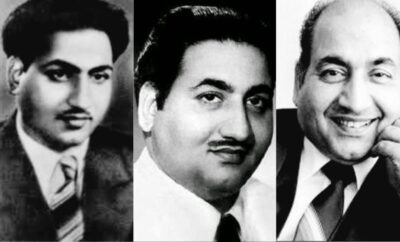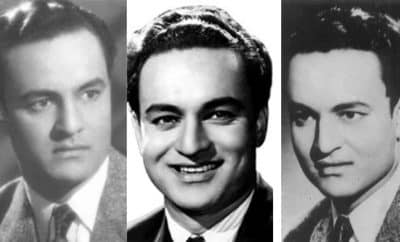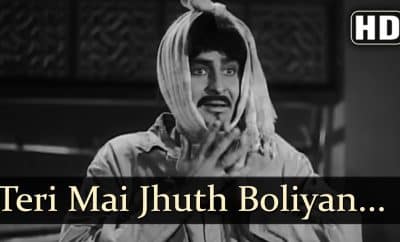Legends
Salil Chowdhury – The Pied Piper of Indian Cinema
His songs over the years have given much joy to the audiences of Indian cinema. A dramatist, writer, scriptwriter, lyricist and musician, composer and arranger par excellence. He’s known to play several instruments, his repertoire of music includes film songs in Hindi, Bengali, Malayalam, non-film songs and background scores in films and serials. An exceptional genius.
Salil Chowdhury was born on November 19, 1923 in the village of Sonarpur, in Bengal. He spent his early childhood in the Bengali village of Harinavi. However, his father was a doctor station in Assam, so he spent a lot of time there as well. His father had a collection of Western classical music, to which the young Salil spent much of his childhood, listening thus influencing the young mind in a great way. The fusion of art and politics was first presented to him by his father. His father used to take villagers and labourers and stage plays; these plays reflected the plight and social conditions of the times. His political interests grew too. He became interested in the “Quit India” movement, as well as the general plight of the underclass. He further joined as an active member in the Peasant Movement of 1945. He also joined the Indian Peoples Theatre Association (IPTA). The purpose of this theatre was to raise the political consciousness of the common people. These theatres went from village to village and performed plays that revolved around the themes of British imperialism, various social iniquities, and the growing freedom struggle. Salil Chowdhury distinguished himself by introducing a new approach to the music while he was still an active member there. Ultimately he had a falling out with the IPTA for varied reasons. During this period he wrote a Bengali story called “Rikshawalla”. This was made into a Bengali movie which became a big hit. It was the success of this film that forever changed his life. The Hindi remake was made under the title “Do Bigha Zameen” and thus began the his journey into the Hindi film industry.
The exceptionally creative songs of Biraj Bahu, Naukri, Amaanat, Taangewaali, Awaaz, Parivaar, Jaagte raho, Apradhi kaun, Ek gaon ki kahaani etc are savoured to this day, with songs from Madhumati serving as the whipped cream topping on the cake. Songs of Parakh, Usne kaha tha, Chhaya, Maya, Kabuliwala, Anand, Mere Apne, Rajnigandha, Chhoti si Baat, Jeevan Jyoti, Mrigaya, Annadata, Anand Mahal follow the ensemble of delights on the huge table he laid for us to relish with. He has composed for over 75 Hindi Films, around 45 Bengali Films, 26 Malayalam Films and several Tamil, Telugu, Kannada, Gujarati, Marathi, Assameese and Oriya Films. He has composed some memorable background music.
His music was a unique blending of the east and the west. He had once said ‘I want to create a style which shall transcend borders – a genre which is emphatic and polished, but never predictable’. His music defies classifications and never follows a predictable format.
Salil Chowdhury was a self taught musician and he never had any guru in music but his experiments in the composition and orchestration were something nobody had attempted till that date. He wrote the lyrics, he composed the music; he arranged, conducted and recorded them into a flawless ensemble of new musical expressions. The pristine harmony with which he used an array of musical instruments, suggests his unique understanding of a large number of musical instruments. His songs charm the listener with the very first listening with a perceptible feel of simplicity. We feel the captivating magic of his music. To imagine his tunes without their accompaniments is impossible. The counter melody is laced around the main melody in such a skilful way.
In an interview first published in 1993 in The Telegraph and then reprinted in 1995, he said that “When I started my music career I imagined the whole world of music as a very tall tower for me to climb and now after all these years I see that the tower has remained as tall as before.”
Salil da’s music,like the pied piper, will continue to mesmerise the listeners for years to come!!




Antara NM
November 19, 2015 at 2:15 pm
Great sum up of a most fascinating music maker. Encapsulates his work beautifully.
One of the scores I like best is Agnipareeksha, awesome songs – melancholic, melodious 🙂
Deepa Buty
November 19, 2015 at 3:21 pm
Thank you Antara 🙂 Oh yes Agnipareeksha has nice scores!! If I’m not wrong you had shared this song……”Aaj koi nahi apna…” in one of the RTS posts 🙂 I like the song!!
Ramakrishna
November 19, 2016 at 6:13 pm
It is a great write up. All the songs which we heard were fantabulous. His CHEMMEN a Malayalam film song s gives me immense pleasure even today. As you regularly you could have added few of his best songs. Videos.
Deepa
November 24, 2016 at 10:38 am
Thank you so much and yes as you said songs could have been added. But you can also check few of his songs in the song sketch section and let us know which one is your favourite among them.